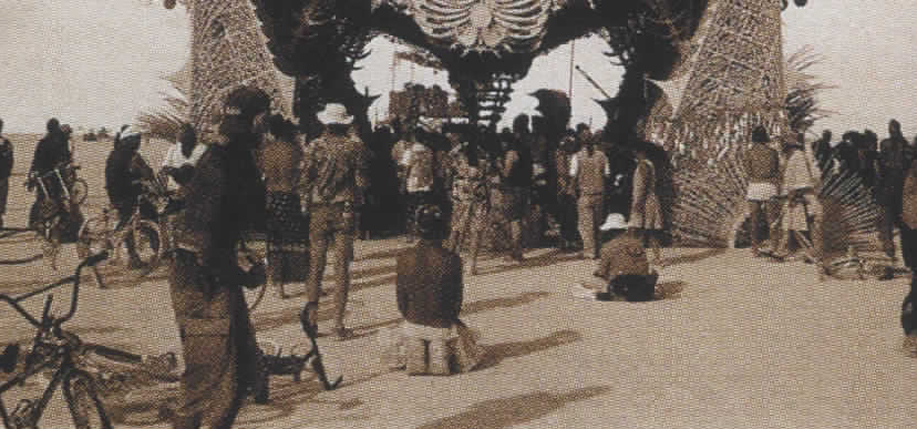“Every year, a virtual city is erected and then destroyed, leaving no trace it was ever there.” So begins the new documentary Confessions of a Burning Man by Irish filmmaker Paul Barnett and his directing partner, UnSu Lee about the week-long arts festival in Black Rock City, Nevada. Founded by artist Larry Harvey in 1990, Burning Man attracts around 30,000 revelers each year who make the pilgrimage to the desert to participate in the festival’s alternate universe. For that week, Black Rock City is the third largest city in Nevada, with residents hailing from every corner of the globe, including Ireland. In fact, according to Barnett, Irish visitors are the second largest contingent at Burning Man.
People come to Burning Man, which is described as “an experiment in temporary community dedicated to radical self expression” for the scene, which is equal parts circus, rave and Woodstock in the wild west. Artists take advantage of the vast amount of space available to construct pieces on a grand scale rife with symbolism: enormous sculptures and fire-breathing machines, as well as mobilized pieces (a pirate ship built around a bus was an audience favorite). Partly derived from Celtic lore, the festival is named after the collosal wooden statue that is set aflame during the enromous ceremony culminating the festivities.
Many people go simply for the party aspect, too. Burning Man has a reputation for being a mostly white, hippie event complete with drugs, sex, music, and daily yoga classes. No money is used and vending is strictly forbidden. Any type of exchange is done on what is called a “gift” system, and every daily act is considered an act of artistic expression.
Each year, Burning Man’s organizers choose a specific theme. For the year the film was made, the theme was the seven stages of man from Shakespeare’s As You Like It, which Barnett mirrored in the selection of his subjects. In the group was a rich heiress, a cynical cab driver, a filmmaker from the ghetto and an accident survivor/actress described by Barnett as “emotionally vulnerable” — all bringing to the experience their unique perspectives and emotional baggage. Watching the group adapt to the sparse, brutal living conditions in the unforgiving terrain of the Nevada desert is often uncomfortable. The film, shot on a mixture of digital video and 16 mm with a perfectly-suited ethereal original score is beautiful to watch.
Confessions of a Burning Man will be released nationwide in early 2004. Lee and Barnett are currently collaborating on the documentary Cracking the Coporate Code. ♦


Leave a Reply